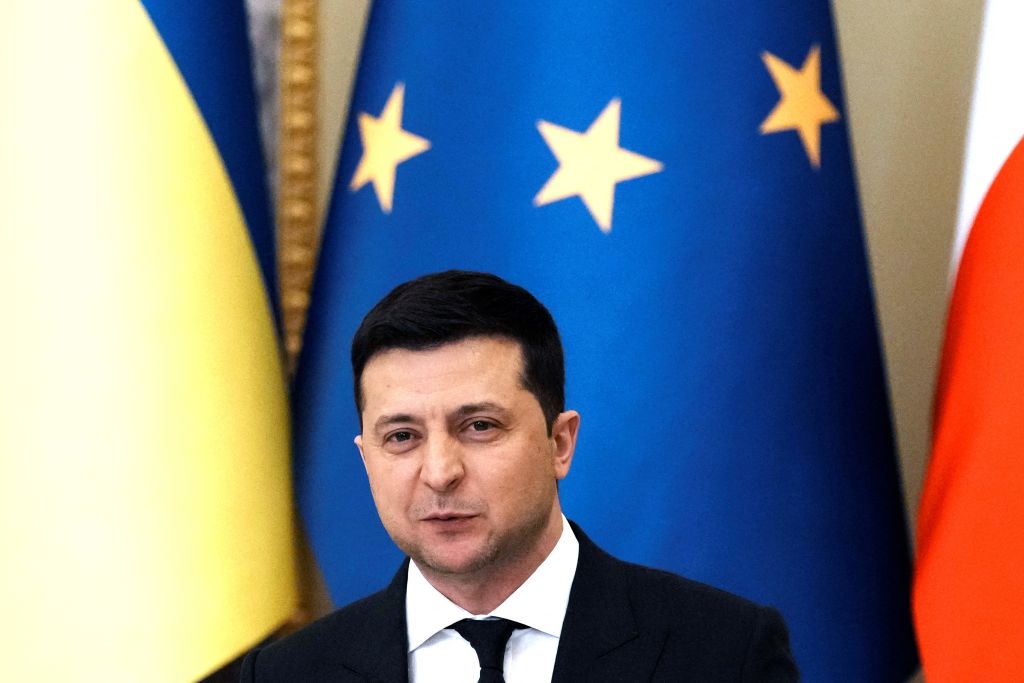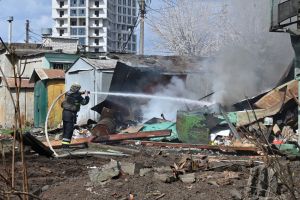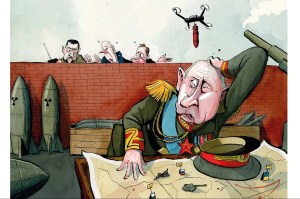It is now a matter of consensus that Vladimir Putin never intended to fight the type of war that now faces him in Ukraine. What was plainly meant to be a blitzkrieg-style assault has devolved into a war of attrition, with death, destruction and violence on a scale unseen in Europe since the disasters of the last century.
It is quite plain that the Kremlin, despite its bluster, is aware of this. The Kyiv government’s claims of Putin dismissing his generals and raving in fury at his security services are consistent with events on the battlefield; indeed, after two weeks of fighting, Russia has only managed to decisively claim one Ukrainian city.
This adds further credence to the narrative of appalling morale among Russian prisoners — many of whom are conscripts rather than professional soldiers — whose despondent social media addresses to family and friends in their homeland are recorded by furious or gleeful Ukrainian captors. The Russian military has also lost three generals and four colonels, and while military strategists might deride Russian senior officers for their demonstrably poor leadership and planning, matters have hardly been improved for the Russian forces by their deaths.
It is not surprising, then, that Putin’s peace talk demands have changed over the two weeks that he never expected to fight. The unhinged mentions of “Nazis” and “drug addicts” ruling Ukraine have been phased — and phrased — out, and the flat failure of Russia’s tank-heavy assault against Kyiv means that ousted Ukrainian leader Victor Yanukovych — who was exiled to Russia in 2014, but has recently been sitting patiently in Minsk — is not likely to return to his old job.
The Kremlin’s current demands are mundane enough to make one wonder what the point was in the vile slaughter and destruction of recent days. Putin insists that Kyiv must abandon all claims to Crimea, recognize the independence of the occupied territories of Luhansk and Donetsk and enshrine international military neutrality into its constitution — in effect, exactly what he has been howling for since the pro-Western Euromaidan revolution of 2014.
At this juncture, with civilian casualties mounting and no direct Western help forthcoming, it seems that Zelensky is prepared to at least consider some of Putin’s demands. It is entirely possible that NATO membership could be abandoned as a foreign policy objective for Kyiv. As Zelensky himself said this week, “I cooled down [on NATO]…after we understood that NATO is not prepared to accept Ukraine.”
It is possible that the Kyiv government is not far from accepting Putin’s terms, and it is here that Zelensky must be careful: much depends on how both his government and people will perceive any peace treaty. It may seem, if not reasonable, at least acceptable: civilian losses continue to mount, and a return to the pre-war status quo — albeit with a major restriction on Ukraine’s foreign policy — would not constitute capitulation or defeat. In addition, recognizing the independence of territories Ukraine didn’t control and abandoning NATO membership that it was never going to earn could also be viewed as better than continuing a war that is so destructive and murderous.
Yet it is also plausible that his people, whose army has done the hitherto impossible and stopped the Russian war machine in its tracks, will wonder what the purpose of their great sacrifice has been if Ukraine is just to earn a flat, simmering peace, that will doubtless nurse a grudge towards Moscow and bitterness for the West. Zelensky’s wartime leadership has enabled his rise from political obscurity to a twenty-first-century Churchill, but it must be remembered how quickly the British public dropped the British Bulldog in peacetime. Naturally, Ukraine’s future security against Russia would also be entirely dependent on Moscow abiding by the neutrality treaty — something that should be treated with a strong degree of skepticism.
For his part, if Putin’s Russia is able to ride the wave of sanctions as he claims it can, the West’s economic and political hostility will continue to feed the Kremlin’s narrative of Moscow being unjustly bullied by America and Europe, thereby allowing Putin to claim that preventing Ukraine from acceding to NATO membership was a stunning success. The Kremlin’s stranglehold on the Russian media — further solidified by the closure of opposition-minded outlets — will further bolster the idea that the cost in lives and materiel, as well as irreparable economic damage, was justified. Not for nothing has Putin continuously attempted to revive the World War Two image of the Soviet Union fighting for its existence. This war is not likely to be Putin’s Napoleon III moment; short of a palace coup, Putin is unlikely to lose his seat in the Kremlin.
But whether both — or neither — Zelensky and Putin are able to present themselves as saviors of their respective nations, a definite loser in this war will be the West. Putin has proved that the inability of NATO to come to any consensus, and its unwillingness to protect partners who were unlucky enough to not quite be allies, renders it ineffective. Even the legally mandated collective defense clause of NATO’s founding charter will not provide much comfort to those former Soviet states who were able to clinch membership just in time before Russia became resurgent.
This is perhaps best demonstrated by the minor matter of supplying Soviet-era NATO aircraft to Ukraine. Exactly why supplying planes would be different from the already-given amounts of advanced anti-tank and anti-air weapons systems has never been articulated, and while the case can be made that artillery systems are a better choice for Ukraine regardless, the performance of Warsaw and Washington both insisting they support the idea of donating aircraft while desperately trying to pass on the responsibility is not one that will be forgotten.
Of course, NATO’s hesitance is hardly sending the strongest message to Georgia, which occupies a similar position on the international stage and is currently floundering in its own attempts to maintain neutrality, efforts which have already resulted in civil strife. Yet the strategic location of Georgia in the resource-rich Caucasus is now more vital than ever with Russian natural resources now unavailable. And security in the region is a concern once again, with another flare-up of fighting between Armenia and Azerbaijan. It may be too late for the West to fully cement its influence in Ukraine, but there is still time for decisive action in Georgia to prevent the loss of the Caucasus.
The Second Cold War that the Western world never wanted is already here, and while it is perhaps trite to repeat the claim that history is nothing if not repetitive, Putin is not entirely wrong to draw upon the past to contextualize the present.
The events of the last century were decided in Sarajevo in 1914, and again in the Sudetenland in 1938 — and the decades to come will be defined in Ukraine.


















